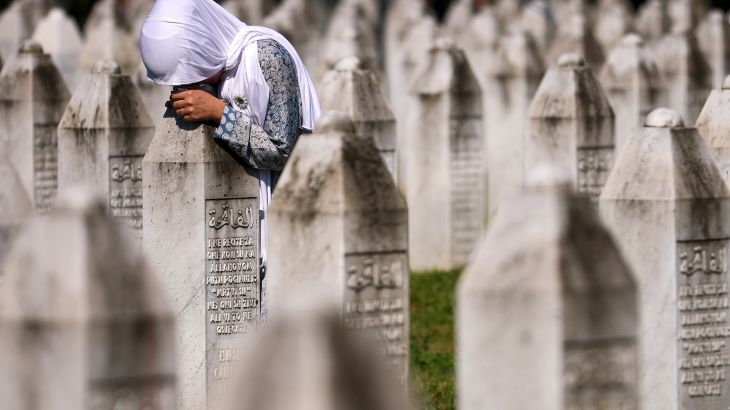Remains of 14 Srebrenica victims to be buried 29 years after genocide
Thousands of people commemorate the 1995 genocide two months after the UN created an annual day of remembrance.
Video Duration 02 minutes 27 seconds 02:27Published On 11 Jul 202411 Jul 2024
The remains of 14 victims of the 1995 Srebrenica genocide in Bosnia and Herzegovina will be laid to rest as thousands of people commemorate the anniversary two months after the United Nations established an annual day of remembrance.
Thirteen men and one teenage boy, recently identified through DNA analysis, will be buried on Thursday at a cemetery just outside Srebrenica in eastern Bosnia 29 years after their deaths.
Keep reading
list of 3 itemslist 3 of 3
The theatrics of genocidal impunity
end of list
Mirza Basic, a genocide survivor who is burying his 22-year-old brother Midhat this year, told Al Jazeera that the sorrow of discovering his brother’s remains almost three decades later was indescribable.
“When the Missing Persons Institute in Bosnia showed me the photographs of my brother’s clothes and the items he had with him, I experienced such strong flashbacks that I instantly relived all those years of war between 1992 and 1995,” said Basic, who was 15 at the time.
The hardest part was sharing the news with his father and sister, also survivors, he said. All three will attend the funeral.
The genocide, Europe’s only acknowledged after World War II, occurred shortly after the break-up of then-Yugoslavia.
On July 11, 1995, Bosnian Serb forces overran the United Nations-protected safe area of Srebrenica, separating at least 8,000 Bosniak men and boys from their wives, mothers and sisters and slaughtered them.
Those who tried to flee were relentlessly pursued through the forests and across the mountains surrounding Srebrenica.
A woman mourns her loved one as the remains of 14 more recently identified Srebrenica genocide victims arrive for burial in Potocari-Srebrenica Memorial Cemetery [Samir Jordamovic/Anadolu]
Basic, a historian, also said the international community was living through another atrocity with Israel’s war on Gaza.
“The images we’re seeing in Gaza today depict oppression and genocide inflicted upon the Palestinian people,” he said.
“I wonder how the world has not learned from what happened in Srebrenica and Rwanda? How, in this modern day and age, some 30 years later, are we once again seeing history repeat itself?”
In a post on X on Thursday, UN Secretary-General Antonio Guterres said he hoped the memory of Srebrenica would “strengthen our collective resolve to build a world free from the scourge of genocide where justice and peace prevail”.
Still seeking justice
In 2007, the International Court of Justice (ICJ) in The Hague, the top UN court, characterised the crime in Srebrenica as genocide. Officials in Serbia and the Republika Srpska, the Serb entity in Bosnia, have continued to deny that a genocide occurred.
Bosnian Serb wartime political leader Radovan Karadzic and his military commander, Ratko Mladic, were both convicted of and sentenced for the genocide in Srebrenica by a special UN war crimes tribunal in The Hague.
In all, the tribunal and courts in the Balkans have sentenced close to 50 Bosnian Serb wartime officials to more than 700 years in prison for the genocide.
Yet, many who are believed to have committed or were involved in the genocide have not been prosecuted.
Omer Hasanovic, another genocide survivor, told Al Jazeera that several of them continue to hold political positions in Republika Srpska.
“In 2003, the Srebrenica Commission compiled a list of 810 individuals known or suspected to have participated in the genocide … but to this day, dozens from that list have yet to be legally prosecuted. It’s unimaginable that such individuals get to be elected,” Hasanovic said.
